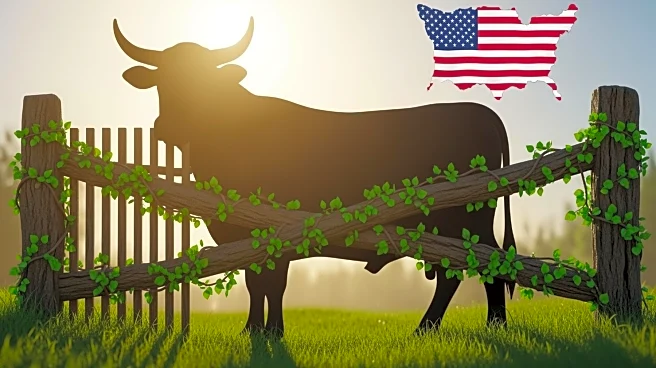What's Happening?
Mexico's agriculture minister, Julio Berdegue, is set to visit Washington to negotiate the reopening of the U.S.-Mexico border for cattle imports. This move comes in response to an outbreak of the screwworm parasite, which has led to the U.S. closing
its border to Mexican cattle since May. The screwworm, a parasite that can be fatal to livestock, has been spreading northward from Central America into Mexico, causing significant concern for both countries' livestock industries. U.S. Secretary of Agriculture Brooke Rollins has criticized Mexico's handling of the outbreak, although Mexico claims to have contained the issue in Nuevo Leon, a state bordering the U.S. The discussions aim to resolve tensions and restore cattle trade between the two nations.
Why It's Important?
The closure of the U.S.-Mexico border to cattle imports has significant economic implications for both countries. Mexico is a major trading partner for the U.S., and the livestock industry is a critical component of this relationship. The screwworm outbreak threatens livestock health and economic stability, potentially impacting beef supply and prices in the U.S. The Trump administration's decision to increase low-tariff imports of Argentine beef to lower domestic beef prices has already caused discontent among U.S. ranchers. A resolution to the border closure could stabilize the cattle market and improve bilateral trade relations, benefiting both Mexican cattle producers and U.S. consumers.
What's Next?
The upcoming meeting between Mexican Agriculture Minister Julio Berdegue and U.S. Secretary of Agriculture Brooke Rollins will be crucial in determining the future of cattle trade between the two countries. If an agreement is reached, it could lead to the reopening of the border, alleviating some of the economic pressures on the livestock industries. However, continued scrutiny of Mexico's response to the screwworm outbreak and the U.S.'s import policies may influence the negotiations. Stakeholders in both countries will be closely monitoring the outcome, as it could have lasting effects on trade dynamics and agricultural policies.















